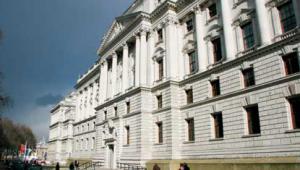Osborne revealed the government would move the public finances into surplus in 2019/20, one year later than forecast at the March Budget.
This was due to changes in the profile of spending cuts to avoid what the Office for Budget Responsibility had said would be a “rollercoaster” of reductions to reach a surplus by 2018/19.
Osborne said the majority Conservative government would “cut the deficit at the same pace as we did in the last parliament” but no single year will see cuts as deep as in 2011/12 and 2012/13 in the last parliament.
“We shouldn’t go faster. We shouldn’t go slower,” he told MPs.
“At this pace the national debt is lower as a share of our national income in every future year than when I presented the Budget in March. And it is achieved without a rollercoaster ride in public spending.”
The OBR has forecast that borrowing will stand at £69.5bn this year, down from £89bn in 2014/15, and will fall to £43.1bn in 2016/17, £24.3bn the following year and £6.4bn in 2018/19. A surplus of £10bn will be achieved the year after that, he said.
Reaching these spending targets will require £37bn of further consolidation to 2020, of which £17bn was set out today and the remainder would be set out in a Spending Review in the Autumn, he said.
As well as a host of reductions in welfare spending, Osborne said there was a need to maintain a tight grip on public sector pay, which was frozen for two years from 2010 and has been limited to 1% per year since.
There was “a simple trade-off between pay and jobs in many public services”, he said.
“Of course, I am conscious that a huge amount has already been done to increase efficiency across Whitehall – with administrative budgets down by over 40% in real terms.
“But there’s still much more we can do. I know there has already been a period of restraint, but we said last autumn that we would need to find commensurate savings in this Parliament.
“So to ensure we have public services we can afford, and protect more jobs, we will continue recent public sector pay awards with a rise of 1% per year for the next four years.”
Responding to the announcement, CIPFA chief executive Rob Whiteman said the continuation of the 1% public sector pay freeze would help the government to control departmental budgets but it could also have an impact on some areas of the public sectors recruitment and retention such as hiring children’s social workers.
Dave Penman, general secretary of the civil service First Division Association, said civil servants were effectively being excluded from the nation’s recovery.
“The chancellor said today that ‘Britain deserves a pay rise and Britain is getting a pay rise.’ Unless, of course, you’re a public servant,” Penman said.
“Public servants are being asked to deliver a further £13bn of spending cuts, yet many of them will be taking home less pay than they did in 2010. A further four years of pay restraint will do nothing to help recruit, reward and motivate the greatest asset the government has: the people who deliver public services.”




















